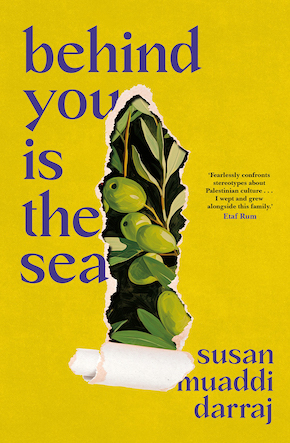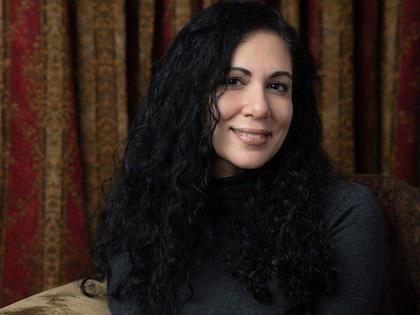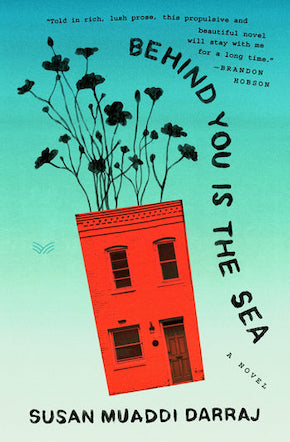Susan Muaddi Darraj: Origins and uncertainties
by Mark Reynolds
Susan Muaddi Darraj began her debut novel Behind You Is the Sea six years ago, as a series of interlinked portraits of daily life among the Palestinian diaspora in Baltimore. The stories that make up the novel are centred on three Palestinian American families who are rooted in a common identity, but whose concerns are at once both deeply personal and universally relatable. Each chapter focuses on a single character as they negotiate political, cultural and intergenerational struggles and the conflicting values of the old and new worlds. At opposing socioeconomic extremes are the shopping mall-owning Walid Ammar and his entitled sons Demetri and Raed, and the Baladi sisters Reema and Maysoon, who live a hand-to-mouth existence. Those in between include feisty lawyer Samira, engaging in multiple private and legal battles, and city cop Marcus Salameh, who is forced to mediate between an ageing father and a rebellious sister, and who is ultimately transformed by a first-ever visit to the West Bank and the prospect of new love.
Given the continuing death and devastation in Gaza right now, even as world leaders timorously back urgent calls for a ceasefire, Muaddi Darraj’s touching, entertaining and wryly observed overview of disparate intersecting lives gently trashes lazy stereotypes, and serves as a timely reinforcement of the anti-war protesters’ stirring assertion that we are all Palestinians.
Mark: How important was it for you that the characters represent much more than the Palestinian diaspora – and also to dispel the misunderstanding that all Palestinians are Muslim?
Susan: As a fiction writer, I try to focus first on the characters and their unique lives, predicaments, what makes them ‘work’ on the page as a realistic embodiment of a full and vibrant life. And perhaps because I’m Palestinian and a Christian, I infuse them with those sensibilities. I’m not trying, in other words, to represent anyone other than the characters who show up in my head and won’t leave. Having said that, I’ll add that I think it’s important that readers get to know Palestinians authentically, so that they understand the diversity in our community – that diversity is woefully absent in media coverage of our people.
Were there any challenges in using your hometown of Baltimore as the backdrop – for you personally, and for your characters?
No challenges, only benefits. I chose Baltimore as the setting because it’s a city in which racial inequities are still starkly apparent. Like many American cities, it has not confronted its racial history, so I thought it would be interesting to establish a community of recent immigrants in such a city – where there is the lure of the American dream, but it has been built on the backs of another community.
When you cannot go home, you are forced to move forward. So Ziyad’s charge is a useful metaphor for any immigrant who is forced to survive and thrive wherever war, colonialism and politics have thrown them.”
The title comes from a speech by Islamic conqueror Tariq ibn Ziyad, who burned his men’s ships on arrival in Spain, declaring, “Behind you is the sea. Before you, the enemy. You have left now only the hope of your courage and your constancy.” How useful is this as a battle cry – or as a philosophy of acceptance – for contemporary Palestinian immigrants?
Palestinians have been historically dispossessed from our homeland since 1948, and most of us actually live and raise our families outside of Palestine. When you cannot go home, you are forced to move forward in the land where you have found yourself. Returning home is not an option. So Ziyad’s charge was quite a useful metaphor for my characters and for any immigrant who is forced to survive and thrive wherever war, colonialism and politics have thrown them.
The younger generation see regret, resignation and despair among their elders, with Reema Baladi noting, “The day he dies, Baba looks skinny and surprised. When he sucks in the last breath, his mouth opens in an O, like America has finally shocked him, and freezes there. It’s like he finally understood he was never meant to win here”, and her sister Maysoon saying: “What I know for damn sure is Mama wishes she’d never left Palestine. She thinks America is one big trick that God played on her.” Are these views something you have witnessed in your own parents’ generation?
I think many Palestinians of that generation have internalised a lot of trauma at being dispossessed… it’s like a wound that never heals. Everything that happens triggers you and reminds you of the magnitude of what you have lost.
There are many strong and enterprising female characters in the novel, making tough, sometimes perilous choices, and overcoming hardship. The male characters are generally more rigid in their outlook, but sometimes capable of reassessment and compassion. To what degree do you regard Behind You Is the Sea as a feminist novel?
It’s an absolutely feminist novel. But I don’t agree with your assessment of the male characters… Marcus certainly changes, and we see many compassionate and loving male figures throughout the book. It’s a feminist novel, yes, but it probably doesn’t align with Western feminist values. The women in my novel, from Amal to Samira to Rita to Reema, are resilient and powerful.
Your previous book A Curious Land also weaves together interlinked stories but you refer to Behind You Is the Sea as your first novel. Four of these stories have been previously published as standalones, but at what stage did you realise they were also building blocks towards a novel?
Very early on. Marcus is my protagonist but I realised I didn’t want to tell the entire book through his perspective. I decided to give each character their own chapter to narrate after I tried telling Mr Ammar’s wedding story through Marcus’s perspective – Mr Ammar is not likeable but he sounded cartoonish from Marcus’s point of view, and so I returned the ownership of his story to him.
Marcus delights in the poetic flourishes that occur in the Arabic language, noting that, in the phrase that translates as “my father has given you his remaining years,” bad news “sounded kinder, almost generous, in Arabic, as if the dead had decided to bestow a gift upon the living.” Then there is: “Okbal al 100 sena. Such a lovely wish – a hundred years of life. The Arabs were a people that knew life could be horrifically unjust and unfair – and yet they cherished it.” What other Arabic phrases do you particularly like that convey a way of seeing that is uncommon in English?
One of my favourites is how we say goodnight: it translates to “May you wake up to good,” or maybe loosely, “May you wake up to goodness and happiness.” It’s just such a loving way to wish someone a peaceful night – I’ve always loved it.
Maysoon observes: “Arabs are ridiculous; even if they live a dream life, they want to star in some tragedy. If there is no tragedy, they imagine one.” Do you believe Arabic speakers are more melodramatic than other ethnic groups?
No, not at all. This is Maysoon’s feeling in the moment because she’s deeply frustrated and experiencing resentment at the unfairness of her economic situation.
That final chapter was a very important one for me – it’s my way of saying to our elders, ‘Our generation knows what you gave up so that we could have a chance, and we will never forget it.’”
The novel builds to the bittersweet clarity of dealing with and moving on from death in the stories ‘Worry Beads’ and ‘Escorting the Body’. At what stage in the writing did you realise the novel would culminate with those highly emotional and revelatory moments?
It was important for me to show that Marcus could eventually understand his hostile and angry father, but only if he understood what his father had lost. That final chapter was a very important one for me – it’s my way of saying to our elders, “Our generation knows what you gave up so that we could have a chance, and we will never forget it.”
I understand you’re planning a second novel based around these characters. How far in are you, and how much can you reveal of what lies in store for Marcus in particular, with his having visited Palestine for the first time at the end of this novel?
I’m trying to write about Marcus and Rita, because she will soon be coming to America and she will be an immigrant. I’m delving into their nascent relationship and her attempts to understand her new life in the United States. I’m not too far along, but character development takes time.
Tell us about how your Farah Rocks series of children’s books came into being. And are you planning any more in a similar vein?
I’m working on a children’s book series about a Palestinian American boy named Jamil, who is in the third grade and plays baseball. I wrote Farah Rocks because I was trying to diversify my own daughter’s bookshelf – there are so few books featuring Arab children in North America, especially books written by Arab authors.
What lessons can be learned from your experience of having an elementary school visit cancelled in the wake of the war in Gaza?
It was quite shocking, really. It was obvious, for a number of documented reasons, that they cancelled my visit because I am Palestinian American. I cannot understand how my planned talk – for which I had a contract and which was supposed to be about the life of an author and the power of imagination – was deemed controversial. I’m one of many Palestinian authors who has experienced this; in fact, many authors who are not Palestinian but who have expressed support for a ceasefire have also had events cancelled. How can people expect authors who write for children to stay silent when children are being killed? I don’t quite understand it.
Which other Palestinian or Palestinian diaspora writers do you particularly recommend?
I recommend Hala Alya, Susan Abulhawa, Hannah Moushabeck, Sahar Mustafah, Sarah Cypher, Rashid Khalidi and Adania Shibli, among many others.
What are the most important disciplines you look to encourage in your creative writing students?
I encourage them to take their time and get to know their characters, because those characters will eventually take over the story. Understand them before you hand over the reins to them. There are many exercises you can do to develop their personalities, back stories and other details.
Has your own writing shifted focus in response to what’s happening now in Palestine?
Yes. I’m hardly able to write. The news devastates me every single day. I don’t know how to function in a world that allows this to happen.
—

Susan Muaddi Darraj is an award-winning writer of books for adults and children. She has won an American Book Award, two Arab American Book Awards, and a Maryland State Arts Council Independent Artists Award. In 2018, she was named a USA Artists Ford Fellow. Her books include the linked short-story collection A Curious Land, as well as the Farah Rocks children’s book series. She lives in Baltimore, where she teaches creative writing at Harford Community College and Johns Hopkins University. Behind You Is the Sea is published in the UK by Swift Press.
Read more
susanmdbooks.com
@susandarraj
@_SwiftPress
Author photo by Matthew D’Agostino
Mark Reynolds is a freelance editor and writer, and a founding editor of Bookanista.
@bookanista
wearebookanista
bookanista.com/author/mark


